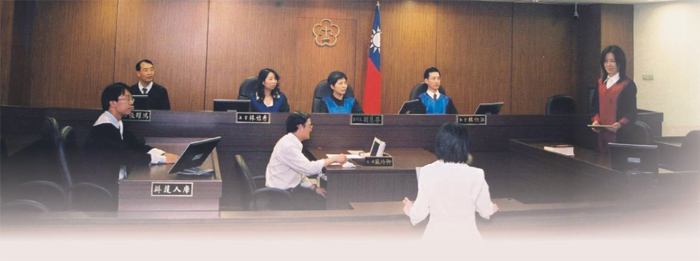Functions
- Publication Date:
- Last updated:2024-04-19
- View count:6497
1. Review of Non-prosecution Decisions
2. Trial Attendance
3. Review of Criminal Judgments
4. Enforcement of Criminal Judgments of Last Resort
5. Review of Post-Mortem Forensic Examination Cases
6. A Platform for Prosecutorial Interaction
7. Assistance in Prisoner Rehabilitation and Victim Protection Affairs
8. Public Service

1. Review of Non-prosecution Decisions
One of the principal functions of the prosecutors in this Office is to review the cases identified as "dissatisfied non-prosecution" and deferred-prosecution (conditional non-prosecution) decisions rendered by the prosecutors of District Prosecutors Office, which are petitioned for reconsideration by the complainants or submitted for review sua sponte (on their own motions). In the instructions addressing the insufficient investigation or improper disposition found in such submitted cases, reasons should be given and/or the insufficiencies should be specified before the dossiers are returned, together with further instructions, to District Prosecutors Office for further investigation. If the reconsideration petition is not legally founded, a dismissal order should be issued. If the complainant disagrees to the dismissal, he or she may, represented by a retained attorney, make an application in writing within ten days after the receipt of the order, to the concerned court in first instance for setting the case for trial.
2. Trial Attendance
On September 1, 2003, the amended Code of Criminal Procedure went into force and brought a substantial impact upon the practice of criminal procedure in Taiwan. Under the amended Code, the prosecutors are to attend all the trial proceedings as prosecuting attorneys at all levels of trial courts, including those in second instance (Taiwan High Court and its Branches). The prosecutors should study the case files in detail and keep close contact with the district prosecutors. They must appear in court at all hearing sessions, present the position of the Prosecution on legal issues, examine witnesses and the accused, and make closing arguments. The prosecutors are responsible for taking consideration of the circumstances both favorable and unfavorable to the accused. The aims of those prosecutorial activities in the trial courts is to assure the prosecution result obtained by the district prosecutors, and to assist the court in the discovery of truth, while maintaining a concern for the procedural rights for the accused.
3. Review of Criminal Judgments
Upon receiving the criminal judgments from Taiwan High Court, the prosecutors of this Office should review the rulings, and if necessary, retrieve relevant dossiers of the specific case, for detailed examination. In cases where the fact-finding remains in question, the law application is improper, the trial procedure is defective, or there exists any other violation against law with the judgments, the prosecutors in charge of the cases will file an appeal to the Court of the third instance, i.e. the Supreme Court. Necessary contact will be made with district prosecutors while deciding whether to appeal. If a judgment of last resort is found in contradiction to law during the course of enforcing a criminal judgment, the dossiers should be submitted with detailed reasons to the Prosecutor General, enabling him to initiate the extraordinary appeal and secure a legal correction from the Supreme Court.
4. Enforcement of Criminal Judgments of Last Resort
When a criminal judgment has exhausted its appeals and becomes finalized, the convicted accused should be immediately transferred directly, or through the assignment to District Prosecutors Offices, to prison to begin serving his/her sentence, with the goal that the penal sanctions can be imposed with due efficiency.
5. Review of Post-Mortem Forensic Examination Cases
All the post-mortem forensic examination cases submitted by the District Prosecutors Offices in competent jurisdictions are reviewed by the prosecutors in this Office. For the cases in which no suspicion of homicide or murder is found, an approval is given for closing the case. For the cases in which the investigation is insufficient, or a suspicion of homicide or murder remains, the dossiers are returned for further investigation.
6. A Platform for Prosecutorial Interaction
This Office holds regular meetings with other prosecutorial levels as well as workshops on specific topics, and encourages information exchange via the intranet, with a view to facilitating communication and the exchange of opinions within prosecutors offices, motivating the esprit de corps for the prosecutors, and in turn promoting the function of prosecution. The practice of prosecution, questions related to administration, and legal issues can be widely discussed on those occasions, so that the common consensus for prosecutorial affairs can be achieved.
7. Assistance in Prisoner Rehabilitation and Victim Protection Affairs
The rehabilitation and protection programs are created to meet humanitarian concerns and to provide coordinated and integrated social resources to assist people discharged from prison to integrate themselves back into society so as to prevent or at least reduce recidivism for the sake of a peaceful society. The protection program for victim of felonies is based upon the spirit of compassion, with an intention to help those innocent victims or the survivors of a crime to resolve their difficulties, alleviate their suffering and re-establish their dignity. By assigning well-trained staff, this Office devotes itself both in rehabilitation and protection matters so as to prevent recidivism and promote social order.
8. Public Service
A full service contact window for the public is operated by the Public Service Center, located on the ground floor of the Judicial Building. Staff is available to take complaints from victims of felonies within jurisdiction of this Office and to handle the questions raised by the public who visit to get legal aid, information regarding petitions, or general legal consultation. The goal is to provide public service that is of the highest quality and highest efficiency.

